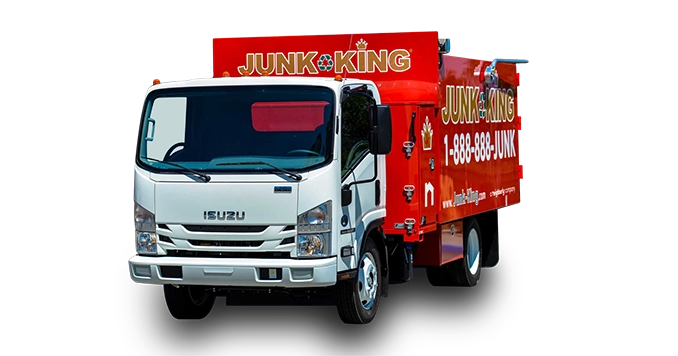
Every contractor knows that construction projects can be unpredictable. However, you can always count on needing construction debris removal!
As a general contractor, you know that every construction project generates debris - garbage, trash and all types of building material waste - and it all has to be cleaned-up, hauled off and disposed of continually. And preferably in a professional and legal fashion.
And the larger the job, the greater the quantity of waste and debris.
Even though fall is just around the corner, the building season is still going full-on for many contractors. But with the looming prospect of rain and shorter days, this can mean a rush to finish projects that are still in-process. One way to expedite the construction process is to find a more efficient way to deal with the cleaning up tasks.
How Much Debris Do You Have?
Ever wonder how much C&D waste (constructionand demolition) and debris you actually produce from your jobs? Although commercial construction projects obviously generate vast quantities of construction garbage, even smaller residential construction jobs can produce surprisingly large amounts of trash.
For example, here are somerecent statistics:
- Typical building demolition averages about 155 pounds of waste per square foot. That means that almost 4,000 tons of waste is produced during the demolition of a 50,000 square foot building. So even taking down a 2,000 square foot home can result in almost 150 tons of debris!
- New construction projects average 3.9 pounds of waste per square foot of building area. For example, almost 98 tons of waste is generated when constructing a 50,000 square foot building. Again, this can mean close to 4 tons of waste material and trash created from building a 2,000 square foot home.
What's in Your Construction Waste?
Most construction and demolition, or C&D, waste is divided into three categories:
- Wasteleft over from new construction (i.e. new material scraps, packaging, etc.)
- Remodeling/demolition debris from older buildings (i.e. old wood, insulation, plaster, brick, fixtures, appliances, etc.)
- Debris from large civil works projects such as highways and bridges (i.e. concrete, asphalt, rubble, etc.
For most residential contractors doing new home construction or renovations and remodels, the debris will be comprised of the first two categories.
So what so you do with all that garbage? Hauling it off and dumping it is the standard approach, but it's not the only way to deal with construction waste.
In fact, another option is to reuse as much of the waste material as possible. We are all familiar with the benefits of recycling and these have been made abundantly clear for a number of years now. But a great option formany contractors is knowing thatconstruction debris recycling can allow for much of their material to berecycled or reused.
For many contractors and other construction professionals, it really does pay to recycle wherever and whatever they can. And, fortunately, many municipalities and private firms have developed the means and resources to make this option not only viable, but relatively easy and profitable for everyone involved.
Contractors Have Three Options for Construction Debris Removal
Typically, there are only three options for managing your construction waste removal.
Here they are in order of the most typical approach taken:
1. You Can Hire a Local Guy With a Truck
Like many other decisions a contractor must make, there are a few options that can be considered for waste trash removal. On one hand, a common option is to simply hire the job out tosome local guy with a truckand hope it gets done right and doesn't take too long.
Although this might seem to be a viable option, the truth is you have a higher risk of running into additional problems using a "guy with a truck".
It may appear to be cheaper than hiring a licensed and professional firm, but in reality, the risks outweigh the benefits. If something bad happens, that guy in a pickup truck could end up costing you a great deal more in the end in terms of both time and money.
There are real issues of safety, potential for damage or theft, and other legal risks. In other words, the seemingly lower cost could end up costing you far more than you anticipated. The bottom line is that, while finding someone else to handle your construction waste removal is a good approach, finding the right person is critical.
2. You Can Haul it Out Yourself
Cleaning, removing andhauling off the construction debriscollected on a job site is usually not high on the priority list for many contractors and sub-contractors. It's not that they underestimate the importance and necessity of the task, but that it doesn't represent "productive" labor on their part of their crew.
In other words, disposing of construction waste istime and money spent that doesn't generate revenue for them.
Another reason is that it can be difficult and even dangerous work. Hauling broken slabs of concrete, for example, or materials with fiberglass or lead-based paints, all present a potential health and safety issues for those cleaning it up and those tasked with properly disposing of it.
In addition to all this, there are the costs for paying crew members for the work and the fuel, wear and tear, and mileage on their own trucks.
3. You Can Outsource to a Professional Firm
Trash hauling and site clean-up is typically considered “part of the job” for most contractors, but it reallydoesn’t have to be.
Consider this: every hour your crew spends picking up debris, cleaning the site, and hauling and disposing of the material, is an hour NOT spent generating revenue on the project. And the bigger the job, the more these non-production costs add up.
And when you add to that the possible costs of hazardous material disposal and possibly required training for your employees, the benefits of outsourcing these tasks become more attractive.
Professional Contractors Know When to Outsource
Whether it's demolition, remodeling, or construction, it's always a time sensitive and costly process to dispose of leftover debris. Concrete, wood, steel, tiling and drywall in particular, can all be extremely difficult to haul off of a construction site.
Even for professional contractors it can be difficult to get rid of all the debris generated after the job is complete.
That's because there is far more to proper construction debris removal than simply throwing stuff into the back of a truck. Knowing what can be disposed of legally and where constitutes a large part of what makes a professional firm the better choice.
And simply taking everything to a local landfill or dump – assuming that there is one – may not always be the most cost-effective option for disposal. In fact, recycling and re-purposing many items and materials is a far more responsible approach for a business to take.
We Can Handle Your Construction Debris Removal
With Junk King you don’t need to worry about the pick up or disposal of the debris after your project is complete.We provide an efficient, safe and eco-friendly construction debrisdisposal service.
Whether you need our services several times during a construction project or just once after it is complete, our hauling professionals will ensure that the construction debris is out of your way so that you can get on with the job.
How can you get us on the site for construction debris disposal? It’s as simple as 1, 2, 3. You make an appointment by booking online above or by calling.
Our professional and insured hauling team will show up at your site; we call 15 minutes before we arrive on and we’ll give you a free estimate based on how much room your debris takes up in our truck. You point and we haul the construction waste into our junk removal trucks, with no hidden fees.
